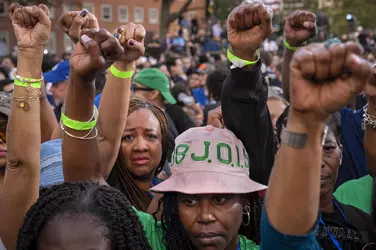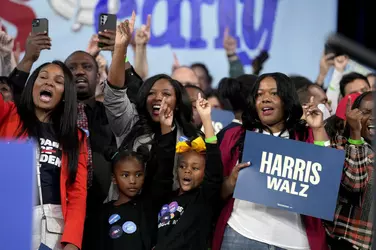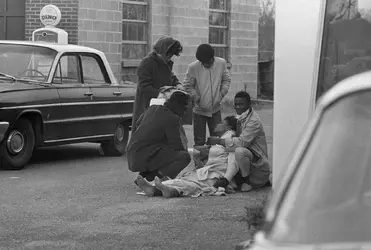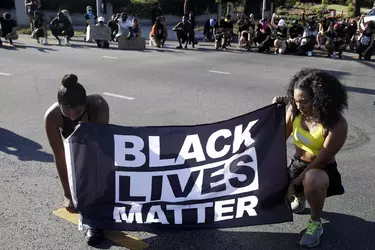Feeling betrayed by increased minority support for Trump, Black women say they’re stepping back
Associated Press (archive.ph)
By Kenya Hunter
2024-11-24 16:35:55GMT

FILE - Supporters of Democratic presidential nominee Vice President Kamala Harris hold up their fists in the air in unison after she delivered a concession speech after the 2024 presidential election, Nov. 6, 2024, on the campus of Howard University in Washington. (AP Photo/Jacquelyn Martin, File)
ATLANTA (AP) — As she checked into a recent flight to Mexico for vacation, Teja Smith chuckled at the idea of joining another Women’s March on Washington.
As a Black woman, she just couldn’t see herself helping to replicate the largest act of resistance against then-President Donald Trump’s first term in January 2017. Even in an election this year where Trump questioned his opponent’s race, held rallies featuring racist insults and falsely claimed Black migrants in Ohio were eating residents’ pets, he didn’t just win a second term. He became the first Republican in two decades to clinch the popular vote, although by a small margin.
“It’s like the people have spoken and this is what America looks like,” said Smith, the Los Angeles-based founder of the advocacy social media agency, Get Social. “And there’s not too much more fighting that you’re going to be able to do without losing your own sanity.”
After Trump was declared the winner over Democratic Vice President Kamala Harris, many politically engaged Black women said they were so dismayed by the outcome that they were reassessing — but not completely abandoning — their enthusiasm for electoral politics and movement organizing.
Black women often carry much of the work of getting out the vote in their communities. They had vigorously supported the historic candidacy of Harris, who would have been the first woman of Black and South Asian descent to win the presidency.
Harris’ loss spurred a wave of Black women across social media resolving to prioritize themselves, before giving so much to a country that over and over has shown its indifference to their concerns.
AP VoteCast, a survey of more than 120,000 voters, found that 6 in 10 Black women said the future of democracy in the United States was the single most important factor for their vote this year, a higher share than for other demographic groups. But now, with Trump set to return to office in two months, some Black women are renewing calls to emphasize rest, focus on mental health and become more selective about what fight they lend their organizing power to.

FILE - Supporters cheer during a community rally with Democratic presidential nominee Vice President Kamala Harris, Oct. 27, 2024, in Philadelphia. (AP Photo/Susan Walsh, File)
“America is going to have to save herself,” said LaTosha Brown, the co-founder of the national voting rights group Black Voters Matter.
She compared Black women’s presence in social justice movements as “core strategists and core organizers” to the North Star, known as the most consistent and dependable star in the galaxy because of its seemingly fixed position in the sky. People can rely on Black women to lead change, Brown said, but the next four years will look different.
“That’s not a herculean task that’s for us. We don’t want that title. … I have no goals to be a martyr for a nation that cares nothing about me,” she said.
AP VoteCast paints a clear picture of Black women’s concerns.
Black female voters were most likely to say that democracy was the single most important factor for their vote, compared to other motivators such as high prices or abortion. More than 7 in 10 Black female voters said they were “very concerned” that electing Trump would lead the nation toward authoritarianism, while only about 2 in 10 said this about Harris.
About 9 in 10 Black female voters supported Harris in 2024, according to AP VoteCast, similar to the share that backed Democrat Joe Biden in 2020. Trump received support from more than half of white voters, who made up the vast majority of his coalition in both years.
Like voters overall, Black women were most likely to say the economy and jobs were the most important issues facing the country, with about one-third saying that. But they were more likely than many other groups to say that abortion and racism were the top issues, and much less likely than other groups to say immigration was the top issue.
Despite those concerns, which were well-voiced by Black women throughout the campaign, increased support from young men of color and white women helped expand Trump’s lead and secured his victory.
Politically engaged Black women said they don’t plan to continue positioning themselves in the vertebrae of the “backbone” of America’s democracy. The growing movement prompting Black women to withdraw is a shift from history, where they are often present and at the forefront of political and social change.
One of the earliest examples is the women’s suffrage movement that led to ratification in 1920 of the 19th Amendment to the Constitution, which gave women the right to vote. Black women, however, were prevented from voting for decades afterward because of Jim Crow-era literacy tests, poll taxes and laws that blocked the grandchildren of slaves from voting. Most Black women couldn’t vote until the Voting Rights Act of 1965.
Black women were among the organizers and counted among the marchers brutalized on the Edmund Pettus Bridge in Alabama, during the historic march in 1965 from Selma to Montgomery that preceded federal legislation. Decades later, Black women were prominent organizers of the Black Lives Matter movement in response to the deaths of Black Americans at the hands of police and vigilantes.

FILE - Amelia Boynton is aided by people after she was injured when state police broke up a demonstration march Boynton helped lead on the Edmund Pettus Bridge, in Selma, Ala., March 7, 1965. (AP Photo)
In his 2024 campaign, Trump called for leveraging federal money to eliminate diversity, equity and inclusion programs in government programs and discussions of race, gender or sexual orientation in schools. His rhetoric on immigration, including false claims that Black Haitian immigrants in Springfield, Ohio, were eating cats and dogs, drove support for his plan to deport millions of people.
Tenita Taylor, a Black resident of Atlanta who supported Trump this year, said she was initially excited about Harris’ candidacy. But after thinking about how high her grocery bills have been, she feels that voting for Trump in hopes of finally getting lower prices was a form of self-prioritization.
“People say, ‘Well, that’s selfish, it was gonna be better for the greater good,’'' she said. “I’m a mother of five kids. … The things that (Democrats) do either affect the rich or the poor.”
Some of Trump’s plans affect people in Olivia Gordon’s immediate community, which is why she struggled to get behind the “Black women rest” wave. Gordon, a New York-based lawyer who supported the Party for Socialism and Liberation’s presidential nominee, Claudia de la Cruz, worries about who may be left behind if the 92% of Black women voters who backed Harris simply stopped advocating.
“We’re talking millions of Black women here. If millions of Black women take a step back, it absolutely leaves holes, but for other Black women,” she said. “I think we sometimes are in the bubble of if it’s not in your immediate circle, maybe it doesn’t apply to you. And I truly implore people to understand that it does.”

FILE - Alycia Pascual-Pena, left, and Marley Ralph kneel while holding a Black Lives Matter banner during a protest in memory of Breonna Taylor, in Los Angeles, July 11, 2020. (AP Photo/Marcio Jose Sanchez, File)
Nicole Lewis, an Alabama-based therapist who specializes in treating Black women’s stress, said she’s aware that Black women withdrawing from social impact movements could have a fallout. But she also hopes that it forces a reckoning for the nation to understand the consequences of not standing in solidarity with Black women.
“It could impact things negatively because there isn’t that voice from the most empathetic group,” she said. “I also think it’s going to give other groups an opportunity to step up. … My hope is that they do show up for themselves and everyone else.”
Brown said a reckoning might be exactly what the country needs, but it’s a reckoning for everyone else. Black women, she said, did their job when they supported Harris in droves in hopes they could thwart the massive changes expected under Trump.
“This ain’t our reckoning,” she said. “I don’t feel no guilt.”
____
AP polling editor Amelia Thomson DeVeaux and Associated Press writer Linley Sanders in Washington contributed to this report.
___
The Associated Press Health and Science Department receives support from the Robert Wood Johnson Foundation. The AP is solely responsible for all content.
Associated Press (archive.ph)
By Kenya Hunter
2024-11-24 16:35:55GMT

FILE - Supporters of Democratic presidential nominee Vice President Kamala Harris hold up their fists in the air in unison after she delivered a concession speech after the 2024 presidential election, Nov. 6, 2024, on the campus of Howard University in Washington. (AP Photo/Jacquelyn Martin, File)
ATLANTA (AP) — As she checked into a recent flight to Mexico for vacation, Teja Smith chuckled at the idea of joining another Women’s March on Washington.
As a Black woman, she just couldn’t see herself helping to replicate the largest act of resistance against then-President Donald Trump’s first term in January 2017. Even in an election this year where Trump questioned his opponent’s race, held rallies featuring racist insults and falsely claimed Black migrants in Ohio were eating residents’ pets, he didn’t just win a second term. He became the first Republican in two decades to clinch the popular vote, although by a small margin.
“It’s like the people have spoken and this is what America looks like,” said Smith, the Los Angeles-based founder of the advocacy social media agency, Get Social. “And there’s not too much more fighting that you’re going to be able to do without losing your own sanity.”
After Trump was declared the winner over Democratic Vice President Kamala Harris, many politically engaged Black women said they were so dismayed by the outcome that they were reassessing — but not completely abandoning — their enthusiasm for electoral politics and movement organizing.
Black women often carry much of the work of getting out the vote in their communities. They had vigorously supported the historic candidacy of Harris, who would have been the first woman of Black and South Asian descent to win the presidency.
Harris’ loss spurred a wave of Black women across social media resolving to prioritize themselves, before giving so much to a country that over and over has shown its indifference to their concerns.
AP VoteCast, a survey of more than 120,000 voters, found that 6 in 10 Black women said the future of democracy in the United States was the single most important factor for their vote this year, a higher share than for other demographic groups. But now, with Trump set to return to office in two months, some Black women are renewing calls to emphasize rest, focus on mental health and become more selective about what fight they lend their organizing power to.

FILE - Supporters cheer during a community rally with Democratic presidential nominee Vice President Kamala Harris, Oct. 27, 2024, in Philadelphia. (AP Photo/Susan Walsh, File)
“America is going to have to save herself,” said LaTosha Brown, the co-founder of the national voting rights group Black Voters Matter.
She compared Black women’s presence in social justice movements as “core strategists and core organizers” to the North Star, known as the most consistent and dependable star in the galaxy because of its seemingly fixed position in the sky. People can rely on Black women to lead change, Brown said, but the next four years will look different.
“That’s not a herculean task that’s for us. We don’t want that title. … I have no goals to be a martyr for a nation that cares nothing about me,” she said.
AP VoteCast paints a clear picture of Black women’s concerns.
Black female voters were most likely to say that democracy was the single most important factor for their vote, compared to other motivators such as high prices or abortion. More than 7 in 10 Black female voters said they were “very concerned” that electing Trump would lead the nation toward authoritarianism, while only about 2 in 10 said this about Harris.
About 9 in 10 Black female voters supported Harris in 2024, according to AP VoteCast, similar to the share that backed Democrat Joe Biden in 2020. Trump received support from more than half of white voters, who made up the vast majority of his coalition in both years.
Like voters overall, Black women were most likely to say the economy and jobs were the most important issues facing the country, with about one-third saying that. But they were more likely than many other groups to say that abortion and racism were the top issues, and much less likely than other groups to say immigration was the top issue.
Despite those concerns, which were well-voiced by Black women throughout the campaign, increased support from young men of color and white women helped expand Trump’s lead and secured his victory.
Politically engaged Black women said they don’t plan to continue positioning themselves in the vertebrae of the “backbone” of America’s democracy. The growing movement prompting Black women to withdraw is a shift from history, where they are often present and at the forefront of political and social change.
One of the earliest examples is the women’s suffrage movement that led to ratification in 1920 of the 19th Amendment to the Constitution, which gave women the right to vote. Black women, however, were prevented from voting for decades afterward because of Jim Crow-era literacy tests, poll taxes and laws that blocked the grandchildren of slaves from voting. Most Black women couldn’t vote until the Voting Rights Act of 1965.
Black women were among the organizers and counted among the marchers brutalized on the Edmund Pettus Bridge in Alabama, during the historic march in 1965 from Selma to Montgomery that preceded federal legislation. Decades later, Black women were prominent organizers of the Black Lives Matter movement in response to the deaths of Black Americans at the hands of police and vigilantes.

FILE - Amelia Boynton is aided by people after she was injured when state police broke up a demonstration march Boynton helped lead on the Edmund Pettus Bridge, in Selma, Ala., March 7, 1965. (AP Photo)
In his 2024 campaign, Trump called for leveraging federal money to eliminate diversity, equity and inclusion programs in government programs and discussions of race, gender or sexual orientation in schools. His rhetoric on immigration, including false claims that Black Haitian immigrants in Springfield, Ohio, were eating cats and dogs, drove support for his plan to deport millions of people.
Tenita Taylor, a Black resident of Atlanta who supported Trump this year, said she was initially excited about Harris’ candidacy. But after thinking about how high her grocery bills have been, she feels that voting for Trump in hopes of finally getting lower prices was a form of self-prioritization.
“People say, ‘Well, that’s selfish, it was gonna be better for the greater good,’'' she said. “I’m a mother of five kids. … The things that (Democrats) do either affect the rich or the poor.”
Some of Trump’s plans affect people in Olivia Gordon’s immediate community, which is why she struggled to get behind the “Black women rest” wave. Gordon, a New York-based lawyer who supported the Party for Socialism and Liberation’s presidential nominee, Claudia de la Cruz, worries about who may be left behind if the 92% of Black women voters who backed Harris simply stopped advocating.
“We’re talking millions of Black women here. If millions of Black women take a step back, it absolutely leaves holes, but for other Black women,” she said. “I think we sometimes are in the bubble of if it’s not in your immediate circle, maybe it doesn’t apply to you. And I truly implore people to understand that it does.”

FILE - Alycia Pascual-Pena, left, and Marley Ralph kneel while holding a Black Lives Matter banner during a protest in memory of Breonna Taylor, in Los Angeles, July 11, 2020. (AP Photo/Marcio Jose Sanchez, File)
Nicole Lewis, an Alabama-based therapist who specializes in treating Black women’s stress, said she’s aware that Black women withdrawing from social impact movements could have a fallout. But she also hopes that it forces a reckoning for the nation to understand the consequences of not standing in solidarity with Black women.
“It could impact things negatively because there isn’t that voice from the most empathetic group,” she said. “I also think it’s going to give other groups an opportunity to step up. … My hope is that they do show up for themselves and everyone else.”
Brown said a reckoning might be exactly what the country needs, but it’s a reckoning for everyone else. Black women, she said, did their job when they supported Harris in droves in hopes they could thwart the massive changes expected under Trump.
“This ain’t our reckoning,” she said. “I don’t feel no guilt.”
____
AP polling editor Amelia Thomson DeVeaux and Associated Press writer Linley Sanders in Washington contributed to this report.
___
The Associated Press Health and Science Department receives support from the Robert Wood Johnson Foundation. The AP is solely responsible for all content.
